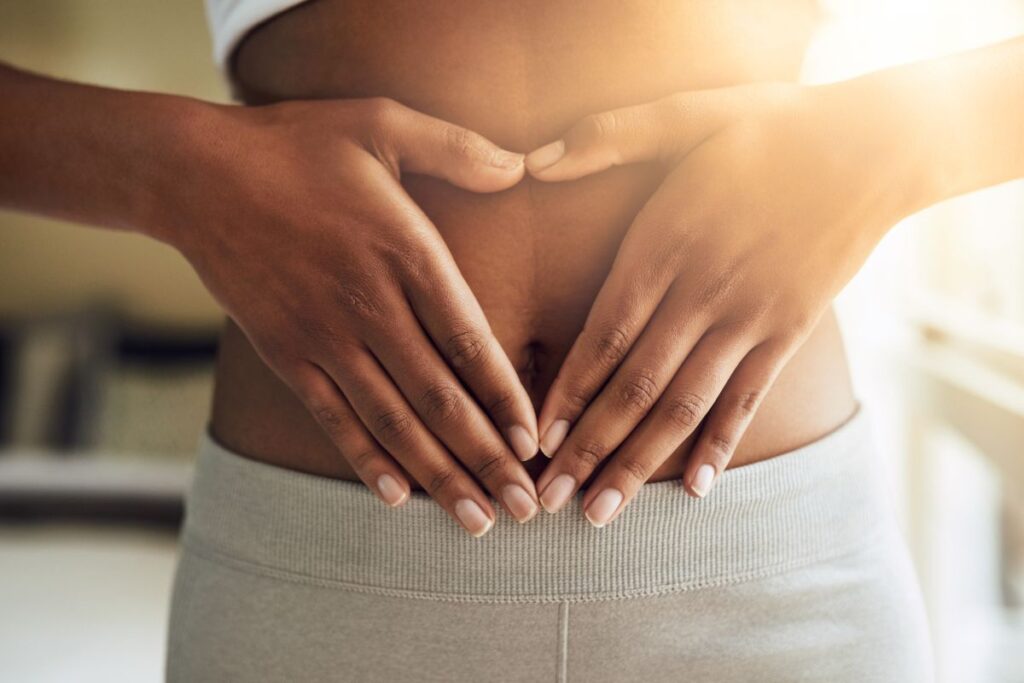How I Healed My Gut After Pregnancy
Cramping, bloating, gas, constipation… can you relate? I used to experience a host of gastrointestinal (GI) complications before, during, and after pregnancy.
Now, as a registered dietitian nutritionist, and mom of 2, I have learned the true secret to finding relief from chronic digestive issues, pain, and discomfort. Read on to discover how you too can heal your gut!

I’d like to clarify that gut issues are very complex and can stem from a variety of root causes including allergies, food sensitivities, pelvic floor dysfunction, autoimmune diseases, anxiety, and more. The following suggestions in this post do not include all possibilities, and it is always recommended to speak with your healthcare provider to discover the true root of your digestive issues.
How I Healed My Gut After Pregnancy
I’ll start from the beginning. My first pregnancy propelled me to take a deep dive into my relationship with food and my body. Although I had already begun my journey into intuitive eating, I was still, unintentionally, knee-deep in diet culture. The natural consequence was unwanted physiological symptoms, like chronic GI issues.
Before pregnancy, I could get away with “forgetting to eat,” avoiding certain types of foods (chips, candy, sweets, etc.), or working out for multiple hours a day – all of which are disordered eating habits. That doesn’t fly for most women during pregnancy. Not only are you encouraged to rest and stay fueled, but there’s also another human relying on your fuel. In turn, disordered eating habits simply can’t hold their power as much.
Needless to say, I truly began fueling my body, resting my body, and eating whatever my body could tolerate at the time even if it was 90% carbohydrates all day.
Pregnancy is a true challenge to disordered eating habits! And what a blessing.
The only problem, however, is that any change in diet or hormones typically results in gut adaptations as well.
As much as I’d like to say that once I began eating the amount of energy my body needed my gut complications went away, that’s not actually what happened. And with pregnancy, they usually get worse.
Once my nausea subsided, my constipation worsened. Once my constipation improved, acid reflux showed up. And once I finally had my baby, well, if you know you know.
Fast forward 6 months. Baby is here, my body is different, and breastfeeding is leaving me just as hungry as pregnancy. But, my chronic GI issues have finally been resolved. And I finally discovered the secret to healing my gut!
7 Tips to Help You How to Heal Your Gut

1.) You Must Eat Enough for Your Gut to Heal and Function Properly
The protective mucosal lining of the gastrointestinal tract (where the gut microbiome lives) is one of the first things affected by inadequate intake, which can quickly cause GI upset.
I try to avoid offering calorie recommendations because our bodies are so different! But I will gently recommend that if you are eating less than 2,000 calories/day (including calories burned during exercise) you are probably not eating enough and your digestive system will not have enough energy or nutrients to function properly.
This is a good place to start. Our organs rely on energy (in the form of food) to function. If you don’t have enough energy (food) your body will immediately preserve your brain, heart, and lungs FIRST. Your digestive system, reproductive organs, skin, hair, and nails, will begin to suffer first.
Feeding your body adequately is a great first step and may help you avoid expensive specialists and testing – though these may be necessary too!
It sometimes takes more than listening to your hunger and fullness cues to know whether or not you’re eating enough, so I always recommend meeting with a registered dietitian to help you walk through this first step!
2.) Consume Enough Fiber, Water, Fat, and Consume Probiotics
- Consume enough fiber through whole grains, fruits, vegetables, seeds, and legumes (women need about ~25g/day).
- Insoluble fiber helps bulk up the stool while also promoting gut motility. Since it is insoluble, it interacts with the water in your body (which is why we need to drink plenty of water to aid in digestion) and helps move the stool along the GI tract. Soluble fiber creates a gel-like substance that may help with constipation while also preventing loose stools.
- Drink enough water (eight 8 oz or more/day, more during pregnancy, breastfeeding, and exercise!)
- Consume enough fat (20-35% of total calories/day). It’s important to consume enough fat especially, unsaturated fatty acids as they help lubricate the stool and intestinal lining. Dietary fat is the most complex macronutrient to digest and consuming too much fat may lead to unwanted GI symptoms such as heartburn, upset stomach, and diarrhea.
- Consume probiotics regularly through fermented food such as kombucha, yogurt, tempeh, kefir, some cheese, etc.)
3.) Catch Some Zzz’s so That Your Body Can Rest and Digest
- Like energy needs, our bodies have different sleep needs. However, if you’re sleeping less than 8 hours/night, there’s a good chance you’re not sleeping enough.
- Lack of sleep can lead to improper hormone regulation, which directly affects digestive function (1).
4.) Honor the Brain-Gut Connection by Reducing Stress
- The brain-gut connection is a powerful, yet underappreciated, attribute our bodies possess. Throughout the walls of our digestive systems lies a powerful system – the Enteric Nervous System (ENS) – which plays a role in digestion, nutrient absorption, and overall health (2, 3). It is sensitive and intelligent, and stress may make or break the proper functioning of this system.
- Have you ever been nervous and felt butterflies in your stomach? Perhaps you even vomited or got diarrhea before an important presentation. That is the brain-gut connection. Our bodies can handle occasional stressful situations.
- However, if your day-to-day is stressful, that will likely impact the way your digestive system functions. In addition, if you regularly do not sleep enough or regularly under-eat, that alone will increase the stress response in your body and impact digestive function.
5.) Stay Active to Support Your Gut Microbiota
- Research suggests that exercise can enrich the gut microbiota profile (4). In addition, exercise increases blood flow throughout the body which can help moves things along in the digestive tract. So don’t forget to use the restroom before you hit the gym! 😉
- It is equally as important to refuel after exercising to ensure your body is receiving enough energy to keep all organs active and functioning properly.
- Once again, I wouldn’t say I like to give recommendations because our bodies are all so different. That being said, it is essential to understand your body’s energy needs and to compensate appropriately when refueling.
6.) Avoid GI-triggering Nutrition Supplements (Use Real Food instead!)
- There are many nutrition supplements and just simple everyday use ingredients, like sugar substitutes. You might not even notice that some of these supplements and ingredients cause digestive distress.
- A good rule of thumb is to meet with a dietitian to have a professional assess your dietary consumption and help guide you to a supplement or a food option that will work with the individual needs of your body. There are too many supplements to list, but here are a few examples:
- Sugar alcohols can cause diarrhea (5)
- Iron supplements can cause constipation
- Creatine can cause upset stomach and diarrhea (not to mention liver dysfunction)
7.) Avoid Frequent Use of GI Relief Supplements (Again, Use Real Food Instead!)
The reason for this is different than the suggestion above. GI relief supplements and OTC medications are great for providing temporary relief. However, if you are relying on a supplement to provide relief from GI symptoms regularly, that will ultimately mask a great nutrition-related problem going on in your body. For example:
- Frequent use of stool softeners and laxatives can lead to lazy bowel syndrome, and mask a greater issue (constipation)
- Frequent use of PPI’s (like Prilosec) for heartburn may lead to increased gastric pH which in other words, causes your body to produce more acid over time (6).
- Antacids are likely masking a great issue (acid reflux) which may be caused by poor diet, eating disorder habits (binging/purging or starvation), or potentially something more serious like a hiatal hernia. Other causes of heartburn are medication use and pregnancy.
- Frequent or overuse of fiber supplements may lead to bloating, gas, or cramps. Keep in mind that 25g of fiber per day for women is recommended for the upper and lower limit. A few grams under or below is normal, but frequent overconsumption (even through food!) may lead to these unwanted GI symptoms.
For me, It took experiencing discomfort in allowing my body to reach the size it was made to be in order to, for the first time ever, heal my gut. It is entirely against what our culture instructs and it is uncomfortable.
As much as I’d love to encourage you to “embrace your body” and move on! I know, first hand, it’s not that simple. It is a journey.
Wherever you are in your journey through body image, your relationship with food, and the health of your gut, know you’re not alone. You are loved and you are held!
Thanks for reading mama!
Written by Sheridan Glaske, MS, RDN, LD






